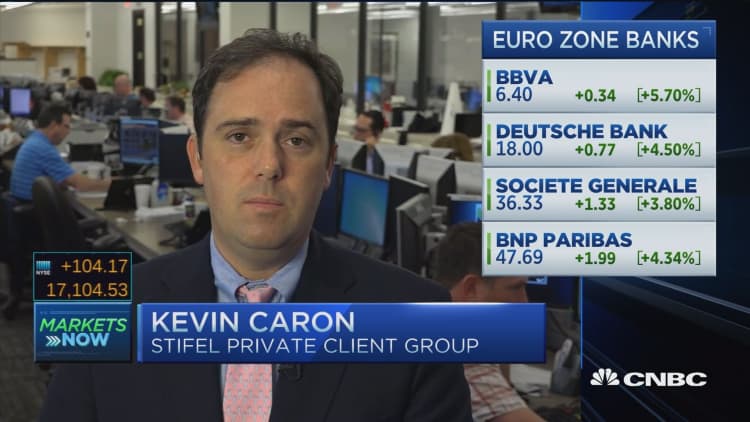


Forget about stimulating the economy, the European Central Bank's endgame is a completely different one, Yra Harris, head analyst at Vine Street Trading, said Thursday.
"This is a bailout of the bad European banks," Harris told CNBC's "Squawk on the Street." "[ECB President Mario] Draghi went as far as he could go before he really ran into the immovable object called the Bundesbank" or Germany's central bank.
"As long as you're talking about bazookas, you're talking about a war. This represents the war between the Bundesbank, Jens Weidmann and Mario Draghi." Weidmann is president of the German central bank.
The ECB on Thursday expanded its already accommodative monetary policy by cutting the benchmark deposit rate to -04 percent from -0.3 percent, while also reducing the refinancing rate to zero from 0.05 percent. The bank also increased its quantitative easing program by 20 billion euros ($22 billion) a month.
The institution also said it could pay banks to borrow from it provided they lend the funds to households and companies under a new targeted longer-term refinancing operations (TLTRO) policy, under which four-year loans would be offered at the ECB's main refinancing rate, with a discount for more active lenders.
"By that TLTRO, what they're going to do is they're going to take all this bad paper," Harris said, referring to debt from countries like Italy, for example.
Markets across the globe seesawed after the ECB's announcement, with the euro posting a significant positive reversal. The common currency hit a six-week low of $1.0823 against the dollar, before trading 2 percent higher at $1.1208.
"The market was expecting him to do something, so he felt that he had to. The problem is really QE, or this unconventional policy and the fact that we are certainly in an age of diminished returns," Joe LaVorgna, chief U.S. economist at Deutsche Bank, said Thursday, referring to Draghi.
"I find it hard to believe that QE, whether in Europe, whether in Japan, the U.S. ... will give us sustained growth, or what we used to call escape velocity, without some serious structural reforms getting made," LaVorgna said in another "Squawk on the Street" interview.
The ECB launched its quantitative easing program in March of last year, but has been unsuccessful in stimulating the European economy.
In the same interview, Kevin Caron, market strategist at Stifel Private Client Group, said, "The market has been discounting a move out of the ECB for the last few weeks, so the strength we've seen over the last two or three weeks is at least partly attributable to an expectation from a zero move."
"Now … there are limits to what you can do with monetary policy."
— Reuters contributed to this report.





